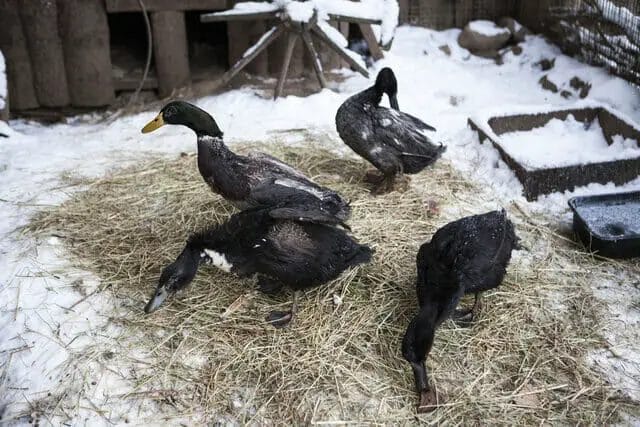Ducks are incredibly cold-hardy, but that does not mean they don’t need human assistance in winter. To keep your duck warm, you don’t need to do much work.
There are some simple tips and tricks that can help your duck survive. The two key elements that’ll ensure the best care for your duck are maintaining housing and food.
Even if the ducks can facilitate themselves to survive in the winter, still, there is some caring and nurturing that needs to be provided. It is seen that wild ducks can’t survive as gently as domestic ones.
Moreover, we know that ducks can survive around 20 degrees F but, what if the temperature drops. So keeping all that in mind, a little maintenance is required.
In this article, I will explain the step-by-step process to keep duck warm in the winter and ensure health.
Keep Duck Warm in Winter: Winter Duck Care Guide

Keeping Duck Warm in Winter
Ducks are intelligent and resilient creatures. They are more adaptable to cold weather than any other birds. As they are cold-hardy, caring for ducks in winter becomes easier.
What Temperature is Too Cold for Them?
Further, ducks have double-layered, slick feathers which sit on the top of warm, thick insulating downy feathers. Under all that, there is a fatty body with a temperature of 106-108 F, which is 10 degrees warmer than the human body.
For this reason, if the ducks are freezing in the winter or soaked from the water, they can maintain their body temperature significantly.
While duck can tolerate ducks is around -15 degrees F.
Natural Cold Tolerance in Ducks:
Like chickens, they don’t have combs or wattles as a result. They are safe from frostbites. The only exposed part of their body is their feet.
But still, the heat exchange system of blood keeps it protected from the sufferings of winter. Ducks have veins, blood vessels, and artilleries close to each other.
When the cold blood from the feet meets the warm blood from the body, the exchange of heat of blood balances the state of the blood in the duck’s body.
Another great thing is the cold blood from the feet doesn’t make its way to the top, which could drop the temperature level. Ducks can tuck their feet into their belly, which helps them to keep the feet warm.
Now,
Below this, I will discuss the process. This is what you need to do to ensure winter duck care-
- Prepare duck farm for winter.
- Ensure food and nutrient during Cool Weather.
Preparing Your Duck Coop to Keep Them Warms in Cold Weather
Isolating a duck coop are is one of the first steps for anyone who wants to protect their ducks from the cold wave.
A perfect housing assures security, temperature balance, safeness, ventilation, and a friendly environment for the ducks.
Here are some steps you need to follow to create perfect housing for the ducks:
1. Ensure Adequate Proper Space
Wooden outdoor housings are the best options for ducks. Make sure the house is enough to keep them warm. The housing needs to be spacious so the ducks can roam freely and live comfortably.
- Duck requires wooden shelter or, shed. For each duck, 2 square feet is enough. For instance, if you have five ducks, they’ll require ten square feet.
- Ducks can handle the cold, but they hate wind. In that case, use a trap at a corner of the duck’s pen. It makes it easier for the ducks to stay cozy.
- Please clean up the duck house properly cause rats and mice looks for a dirty place for infestation or, make their nests. They can eat up your eggs, damage the coop, and can take ducklings as prey.
This is essential to ensure because, they don’t get chances move around and swim.
2. Provide Extra Straw for Bedding
Use straw on the ground of the duck house or, coop. Straws are great insulators it is effective to keep the ducks warm. The quantity of the straw depends upon how many ducks are you keeping in the house.
- At night ducks love to snuggle down into bedding to keep them warm.
- Also, they make nests to lay eggs which helps to find the eggs most easily.
- The ducks have a perfect time shoveling, digging, and floating in the straw.
- But if you live in a region or an area where the coldness is way higher than normal then use bales of straw on the floor.
3. Change and Clean up Bedding More Frequently
Change the straw from the house when necessary. You don’t wanna end up with a messy farm. Also, a dirty, messy house can infect your ducks with serious diseases. You can use the old straw for the compost pile.
During the day the ducks may wanna wander outside. But the grounds are snowy, they won’t be able to stand properly or, some may be standing on one leg which can lead to amputation.
Laying some straw on the outside will solve the problem. As a result, the ducks can enjoy the environment and fresh air during the day. Further, you can also use pieces of wood, benches, pallets in the ground too. To protect the sucks from the cold wind you can make barriers at a corner house too.
4. Ensure Ventilation & Fresh Airflow
On the nights the ducks spend most of their time in the coop. So they pass their time eating, pooping, grooming, and sleeping.
As ducks are nastier than chickens these actions make the environment moist. The environment is thick with germs and bacteria.
And by inhaling the air of this condition can cause the ducks respiratory problems.
The moisture can start cooling the environment of the coop that can lead to frostbite.
Further while sleeping at night the ducks also emit a lot of moisture that can lead to the same problems.
- To keep the condition balanced inside the coop, there should be air holes, vents, windows in the coop.
- There should be enough vents to emit all the moisture from inside.
- The vents have to be installed way up high and in the opposite direction of cold airflow and breeze.
- Cause keeping vents in the bottom level can make the place cold and has a greater risk of predators.
- Also, use a blanket to cover up, when required.
5. Avoid Heat Lamps
Don’t use heat lamps in the coops. There is a great risk of a fire hazard if you do so.
Ducks can move here to there aimlessly and you never know what could happen with sudden movements. As it was said before ducks have enough to take care of themselves in the winter.
The waterproof feathers and fatty belly are more than enough to keep them warm. But the housing provides extra security if conditions get worse that’s all.
6. Use Artificial Lighting
Artificial lighting is the key component if you’re concerned about egg production. Use the light half an hour before the beginning and the ending of the day.
Although the rate of egg production will decrease in the winter.
Now, lets explore the other part, how to keep them healthy in cold days.
Food and Diet for Ducks to Keep Them Healthy Through out the Winter
You need to feed your ducks the best diet possible. As they’ll have to go through rough weather like winter they’ll need all the best nutrition they can get. Protein is an essential ingredient for any duck food. Before purchasing any protein-based food check if the proportion between 16%-18%.
1. Greens and High Calorie For the Duck:
Provide the duck with a high-quality layer pellet like the rest of the year. The diet plans need to be changed in the winter season.
- Ducks won’t be able to forage on the ground for slugs, snails, and bugs as there’s snow everywhere.
- Further, the rivers are frozen so there’s no chance for them to doddle. Birds use most of their calorie to stay warm in the winter. S
- ince there lacking their necessary protein and calories you need to fill up those gaps.
Lettuce, kale, cabbage shreds, warm plain oatmeal can help you with that. Also, treat them with peanuts, cracked corn, oatmeal, corn in the evenings. They take a longer time to digest as a result it keeps them warm all night long.
It’s better if your ducks gain weight cause then they develop extra fat in their bodies which is a major element to keep them warm too.
2. Provide Drinkable Water
Water is a vital ingredient for ducks. Not only it quenches their thirst but it helps to digest food and is used in cleaning their sinuses and eyes. But don’t give any food to the ducks if won’t provide water.
Cause otherwise, they’ll choke. Use heated dog bowls to keep the water warm.
Change the water regularly so the ducks won’t have to drink dirty water. Don’t leave the water bowl with the ducks at night.
As ducks are filthy creatures they’ll play around with water making the coop a nasty place. Which can make their bedding cold.
To stop the dehydration of the ducklings they should have the access to water every four hours at least.
Ducks won’t be able to swim as all ponds will be frozen due to winter. But on some warm-sunny days, they can go to the pond, splash some water, dip themselves in, clean themselves a bit for a little entertainment.
The Final Words
Ducks farming is getting popular in small farms. Winter care for ducks are important to maintain profitable farming.
Wet feed or bedding can causes lethargy, diarrhea, decreased appetite/weight, seizures, dehydration, drooping wings, unsteadiness.
So make sure to cleanup the hood and add straw regularly.
Hope, you find your answer. If not, you can ask question in the comment below.

Thanks! For awesome guide on winter duck care to keep them warm.
You are wellcome.